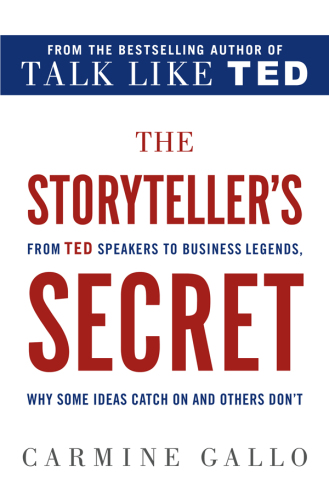
The Storyteller's Secret
From TED Speakers to Business Legends, Why Some Ideas Catch On and Others Don't
کتاب های مرتبط
- اطلاعات
- نقد و بررسی
- دیدگاه کاربران
نقد و بررسی

December 21, 2015
According to communications coach Gallo (The Presentation Secrets of Steve Jobs), “You don’t choose your passion; it chooses you.” Successfully selling that passion to others, he confides in this helpful primer, means becoming a master storyteller. Gallo believes that the first step to finding your own story is answering the question of what makes you happy. He uses the stories of accomplished storytellers such as Richard Branson, Joel Osteen, Tony Robbins, and Oprah Winfrey to demonstrate the ways in which self-narrative informs self-confidence—and helps speakers convince others. Explaining how to help listeners comprehend a message, he reminds readers, “If you can’t tell it, you can’t sell it.” Highly narrative and personality-driven, these stories, backed up by checklists and concrete tips, may not break any substantial new ground, but Gallo’s enthusiastic and encouraging style is infectious. Readers with an idea to sell—whether for profit or for social justice—will find this an indispensable guide to articulating a sales pitch. Agent: Roger Williams, New England Publishing Associates.

December 15, 2015
A self-help book from a communications coach and respected keynote speaker. To achieve success and renown, Gallo (Talk Like TED: The 9 Public-Speaking Secrets of the World's Top Minds, 2014, etc.), who has consulted for Pfizer, LinkedIn, Coca-Cola, and other major brands, urges readers to tell a good story. In nearly every presentation, stories beat logic or evidence, so tell a captivating tale in every sales pitch or TED talk (the author's ultimate venue). To demonstrate, Gallo begins each chapter with a homily of someone's life-changing epiphany and ends with a quick summary, "the storyteller's secret." The inspiring accounts invoke such notable names as Gates, Jobs, Springsteen, and Sting. Also included in the narrative are tales of Churchill, Branson, Oprah, and Pope Francis. All of these figures are wonderful storytellers who have educated and motivated us. They simplify their messages, launch movements, and inspire the world. Promoting a personal brand takes significant work, but Gallo helpfully encapsulates a score of the leaders' secrets in brief--e.g., "reframe the story you tell yourself" ("Joel Osteen, Darren Hardy), "make stories at least 65 percent of your presentation" (Bryan Stevenson, Sheryl Sandberg), "violate expectations" (Bill Gates, Elon Musk), "take every opportunity to hone your presentation skills" (Martin Luther King Jr.). For mastery of brilliant storytelling, Gallo provides an appended checklist for aspiring readers who may find the foregoing chapters too heavy with pop neuroscience and references to obscure experts. The take-away: your limbic brain, oxytocin, and good PowerPoint slides, coupled with a perfected story, can make you a billionaire or, if you like, a changer of the world--or maybe, just a bit more prosperous. The old pep talk by another proficient motivational master, updated with references to Twitter, YouTube, and, of course, TED.
COPYRIGHT(2015) Kirkus Reviews, ALL RIGHTS RESERVED.

February 1, 2016
Gallo (Talk Like TED) engages readers with a litany of stories and storytelling techniques for anyone looking to give better presentations, make better pitches, or run better meetings. If your work supports an idea, business, product, brand, or institution, you will find useful advice within these pages. Gallo's modus operandi throughout is to draw from the lives of rags-to-riches figures and explain their methods. Some are household names (Steve Jobs, Oprah Winfrey), while others are successful businesspeople (Sara Blakely, Charles Michael Yim). Each brief chapter begins appropriately with an attention-grabbing anecdote from the individual's life and then moves to brief second and third acts--with the headings "The Storyteller's Tools" and "The Storyteller's Secret." These sections are the meat in which Gallo digs into techniques such as infusing message with mission, using analogies, violating audience expectations, employing metaphor, and introducing relevant details. Many of the lessons--telling tales of trials and wrapping data with story, for example--come up repeatedly but for good reason. VERDICT This entertaining and informative overview of how famous storytellers build loyalty, sell products, and inspire others will appeal to general readers.--Paul Stenis, Pepperdine Univ. Lib., Malibu, CA
Copyright 2016 Library Journal, LLC Used with permission.

























دیدگاه کاربران